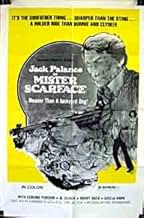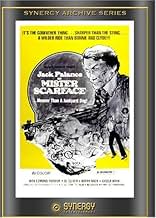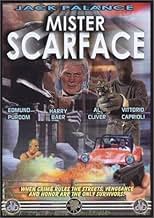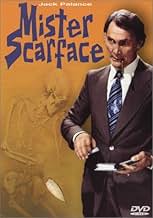IMDb-BEWERTUNG
6,1/10
1230
IHRE BEWERTUNG
Füge eine Handlung in deiner Sprache hinzuTwo small-time hoodlums plot to get even with a treacherous boss who is intent on monopolizing all criminal activity within Rome.Two small-time hoodlums plot to get even with a treacherous boss who is intent on monopolizing all criminal activity within Rome.Two small-time hoodlums plot to get even with a treacherous boss who is intent on monopolizing all criminal activity within Rome.
Carmelo Reale
- Luca
- (as Roberto Reale)
Raul Lovecchio
- Manzari Goon
- (as Raul Lo Vecchio)
Erigo Palombini
- Manzari Goon
- (as Enrico Palombini)
Empfohlene Bewertungen
Rulers of the City does have a lot going for it. It does fall short of being great, and Fernando Di Leo and Jack Palance have done better in their respective careers, but this is not even close to being career-worsts for either and is a very respectable film overall.
The locations are splendid, and the gritty roughness of the photography and clever (without being too much or too dizzying) camera angles capture it more than ideally. There is also a dynamite score, exhilarating action scenes (the final shootout being the prime example) and mostly above-decent direction, if in need of more tension in places. The script is tight and more light-hearted than Di Leo's Milieu trilogy, but it was light-heartedness and witty humour that didn't feel too misplaced, and the story is at least engrossing and swiftly paced on the most part.
Casting-wise, Rulers of the City is very much a mixed bag, with the best performances being from a sinister Jack Palance (though he was deserving of more screen time) and a lively and lots-of-fun, without being too clownish, Vittorio Napoli as the film's most colourful character. Harry Baer has some charming moments too and Giselda Hahn brings a little heart. Al Clivar however does show his limitations as an actor in a somewhat one-note performance and Edmund Perdum is rather stiff in an underwritten role.
Aside from a slow-motion dream-like opening sequence, that was quite striking if perhaps not necessary, Rulers of the City does take too long to get going and the story only really comes to life once Palance appears. The film was in need of more tension and suspense, and stronger writing for the villains (who were underutilised and never really developed, and this is including Palance's character) would have helped. The final shoot-out is great, but ends a little anti-climactically. And I do have to agree about the homo-erotic undertones and homosexuality hints being clumsily written and out of place, which did feel the film a bizarre feel at times.
Overall, respectable but could have been better. 6/10 Bethany Cox
The locations are splendid, and the gritty roughness of the photography and clever (without being too much or too dizzying) camera angles capture it more than ideally. There is also a dynamite score, exhilarating action scenes (the final shootout being the prime example) and mostly above-decent direction, if in need of more tension in places. The script is tight and more light-hearted than Di Leo's Milieu trilogy, but it was light-heartedness and witty humour that didn't feel too misplaced, and the story is at least engrossing and swiftly paced on the most part.
Casting-wise, Rulers of the City is very much a mixed bag, with the best performances being from a sinister Jack Palance (though he was deserving of more screen time) and a lively and lots-of-fun, without being too clownish, Vittorio Napoli as the film's most colourful character. Harry Baer has some charming moments too and Giselda Hahn brings a little heart. Al Clivar however does show his limitations as an actor in a somewhat one-note performance and Edmund Perdum is rather stiff in an underwritten role.
Aside from a slow-motion dream-like opening sequence, that was quite striking if perhaps not necessary, Rulers of the City does take too long to get going and the story only really comes to life once Palance appears. The film was in need of more tension and suspense, and stronger writing for the villains (who were underutilised and never really developed, and this is including Palance's character) would have helped. The final shoot-out is great, but ends a little anti-climactically. And I do have to agree about the homo-erotic undertones and homosexuality hints being clumsily written and out of place, which did feel the film a bizarre feel at times.
Overall, respectable but could have been better. 6/10 Bethany Cox
What went wrong here? Fernando Di Leo drops the ball in a meandering crime film that takes almost fifty minutes to get anywhere and doesn't feature any particularly interesting characters. All Jack Palance does is scowl with a cigarette in his mouth, something you've seen him do in a dozen other films.
It starts out with a kid witnessing his father being killed by Jack Palance, then we fast forward to the present (seventies Rome), where Tony works for local mob guy Luigi (played by a very pale Edmund Purdom). Tony wants to work the big leagues and ends up teaming up with Al Cliver, a guy who until recently worked for Palance. I guess the mystery is figuring out which one of them was the kid at the start of the film.
The first two thirds of the film concentrate on these two scamming Palance while also fighting with Purdom's second in command, and the main problem is neither of the leads are that interesting. The only character with any depth is the old Neopolitan pickpocket who gets caught up in the all the madness. For some reason though his character has an over the top Italian accent whilst everyone else is dubbed American.
Most of the action takes place in the last half hour of the film, where finally everyone gets their guns out. This is where Al Cliver shines as he's not the best at being emotional, but at least he looks cool gunning people down. The whole film seems a bit tired and it's as if Di Leo didn't know where to take the story, and as there's about a million Eurocrime films from 1976, this one doesn't quite cut it.
It starts out with a kid witnessing his father being killed by Jack Palance, then we fast forward to the present (seventies Rome), where Tony works for local mob guy Luigi (played by a very pale Edmund Purdom). Tony wants to work the big leagues and ends up teaming up with Al Cliver, a guy who until recently worked for Palance. I guess the mystery is figuring out which one of them was the kid at the start of the film.
The first two thirds of the film concentrate on these two scamming Palance while also fighting with Purdom's second in command, and the main problem is neither of the leads are that interesting. The only character with any depth is the old Neopolitan pickpocket who gets caught up in the all the madness. For some reason though his character has an over the top Italian accent whilst everyone else is dubbed American.
Most of the action takes place in the last half hour of the film, where finally everyone gets their guns out. This is where Al Cliver shines as he's not the best at being emotional, but at least he looks cool gunning people down. The whole film seems a bit tired and it's as if Di Leo didn't know where to take the story, and as there's about a million Eurocrime films from 1976, this one doesn't quite cut it.
"Rulers of the City" is enjoyable for fans of the Italian crime flick, with a fast moving story and a sense of humour to let you know that it's never taking itself too seriously. The actors are all good and the film is effectively violent without ever getting very bloody. True enough that it may not be all that believable, but it *is* entertaining, if not memorable in the end. Director Fernando Di Leo was prolific in this genre and the viewer may want to check out his other works; they're available in DVD and Blu-ray box sets from Raro Video.
The amiable Harry Baer stars as Tony, a young debt collector who's tired of his go-nowhere job. So he hatches a scheme with aging mobster Napoli (Vittorio Caprioli) and his new friend Rick (Al Cliver of "Zombi 2") to con big time hood Manzari (Jack Palance) out of several million. Naturally, things don't work out the way that they want and they end up having to make a stand against Manzari and his goons.
It's enjoyable to see this international, familiar cast at work. Palance is convincing as the bad guy, the engaging Caprioli supplies a good deal of the comedy relief, Edmund Purdom (the dean in "Pieces") has a welcome presence as mafioso Luigi Cherico, the lovely Gisela Hahn provides the eye candy (and also sings some tunes), and Enzo Pulcrano is amusing as volatile jerk Peppi, who's out to get Tony. Co-scriptwriter Peter Berling also plays the role of Valentino in the film.
All in all, this is pleasant to watch, with a reasonably rousing action climax and an eclectic score by Luis Bacalov.
Seven out of 10.
The amiable Harry Baer stars as Tony, a young debt collector who's tired of his go-nowhere job. So he hatches a scheme with aging mobster Napoli (Vittorio Caprioli) and his new friend Rick (Al Cliver of "Zombi 2") to con big time hood Manzari (Jack Palance) out of several million. Naturally, things don't work out the way that they want and they end up having to make a stand against Manzari and his goons.
It's enjoyable to see this international, familiar cast at work. Palance is convincing as the bad guy, the engaging Caprioli supplies a good deal of the comedy relief, Edmund Purdom (the dean in "Pieces") has a welcome presence as mafioso Luigi Cherico, the lovely Gisela Hahn provides the eye candy (and also sings some tunes), and Enzo Pulcrano is amusing as volatile jerk Peppi, who's out to get Tony. Co-scriptwriter Peter Berling also plays the role of Valentino in the film.
All in all, this is pleasant to watch, with a reasonably rousing action climax and an eclectic score by Luis Bacalov.
Seven out of 10.
Writer/director Fernando Di Leo chronologically made three of the most stupendously amazing "Poliziottesco" (hardcore Italian cop/gangster thrillers) milestones with "Milano Caliber .9", "La Mala Ordina" and "Il Boss". I respectively granted those films with rating 10/10, 9/10 and 9/10
just to indicate how powerful and overwhelming they are. Di Leo honestly was a brilliant but sadly underrated director who really knew how to make hardcore-to-the bone action movies. There are no good or loyal characters in Fernando Di Leo's depiction of the Italian mafia
There are only vicious and emotionless gangsters that would butcher their own parents in order to climb one small step up the ladder of power & influence. Although nearly not as brilliant as the aforementioned trio, Di Leo's later films keep featuring the same story elements. "Rulers of the City" – the literally translated title which I vastly prefer over "Mister Scarface" – is another mafia flick full of ultra-sadistic characters, nasty double-crossings, merciless executions, brutal bare-knuckle fistfights and explosive vendettas.
Tony is a smooth and handsome but insignificant guy who works as a debt collector for Luigi Cherico; the number #2 gangster boss of Naples. He wants to make an impression on his boss and ingeniously plunders 10 million Lire from the absolute biggest crime lord in town, the feared and relentless Scarface. Tony unwillingly evokes a mafia war in Naples and finds himself in between the two camps. Luckily he receives help from an elderly Mafiosi and a mysterious blond shooting expert with an old personal vengeance to settle. "Rulers of the City" has a well- written and fast-paced script, and all the fistfight battles and shootout sequences are exhilarating and brute. The film also benefices from neat camera-work and a terrific score provided by Di Leo's regular composer Luis Bacalov. Still, "Rulers of the City" suffers from two serious defaults that simply cannot be neglected. First of all, everything is done to make it seems like the entire film orbits around Jack Palance and his character Mr. Scarface, but his role honestly isn't that extended or fundamental. The DVD-cover image that I own illustrates Jack Palance looking bewildered and firing off a machine gun, but never at one point during this movie he takes the effort of even picking up a weapon. Secondly, what's with the homo-erotic undertones in this film? It isn't too abnormal that there generally aren't many female lead roles in Italian gangster movies, but this one exaggerates! The only women in this film are secretaries, prostitutes and walking eye-candy on the sidewalk. Furthermore the hints at homosexuality are downright bizarre and misplaced. The older Mafiosi Vincenzo Napoli is obviously gay, with his pink scarves and feminine gestures the entire time, but even the two lead actors could easily pass for a cute couple. Whenever they're driving around the city in Tony's flamboyant buggy, they look like an advertisement campaign for coming out of the closet and the only thing missing is a slogan on the bottom of the screen saying "it's okay to be gay".
Tony is a smooth and handsome but insignificant guy who works as a debt collector for Luigi Cherico; the number #2 gangster boss of Naples. He wants to make an impression on his boss and ingeniously plunders 10 million Lire from the absolute biggest crime lord in town, the feared and relentless Scarface. Tony unwillingly evokes a mafia war in Naples and finds himself in between the two camps. Luckily he receives help from an elderly Mafiosi and a mysterious blond shooting expert with an old personal vengeance to settle. "Rulers of the City" has a well- written and fast-paced script, and all the fistfight battles and shootout sequences are exhilarating and brute. The film also benefices from neat camera-work and a terrific score provided by Di Leo's regular composer Luis Bacalov. Still, "Rulers of the City" suffers from two serious defaults that simply cannot be neglected. First of all, everything is done to make it seems like the entire film orbits around Jack Palance and his character Mr. Scarface, but his role honestly isn't that extended or fundamental. The DVD-cover image that I own illustrates Jack Palance looking bewildered and firing off a machine gun, but never at one point during this movie he takes the effort of even picking up a weapon. Secondly, what's with the homo-erotic undertones in this film? It isn't too abnormal that there generally aren't many female lead roles in Italian gangster movies, but this one exaggerates! The only women in this film are secretaries, prostitutes and walking eye-candy on the sidewalk. Furthermore the hints at homosexuality are downright bizarre and misplaced. The older Mafiosi Vincenzo Napoli is obviously gay, with his pink scarves and feminine gestures the entire time, but even the two lead actors could easily pass for a cute couple. Whenever they're driving around the city in Tony's flamboyant buggy, they look like an advertisement campaign for coming out of the closet and the only thing missing is a slogan on the bottom of the screen saying "it's okay to be gay".
Energised to some degree by some inspired acting, this violent little crime caper has a young, carefree protection collector (Baer) swindling a big-time hood (Palance) out of 10 million Lira only to discover that his "good deed" has deadly consequences for all concerned. His alliance with a former gang member of the hood (Cliver) may be the only chance he has to clear his debts, and survive, but there's another motivation for Cliver's expert assistance.
Palance is wasted talking out the corner of his mouth while he incessantly chews on a durry filter, while poor old Edmund Purdom really has things tough in this film. His character is publicly emasculated and betrayed by his own favoured son. The role isn't especially prominent, nor key to the plot, so Purdom's appearance in it is both unusual (for such a distinguished actor) and ultimately frivolous. Baer is likable as the charismatic "enforcer", who attracts as much attention from the ladies as he does from those attempting to kill him. Rotund funny-man Caprioli as the wily old Purdom gang member over-indulges in the humour, becoming a parody. Overall, it's very hit and miss.
There's not much to recommend; lots of fisticuffs, gun-fights, car-chases and the like, but the tongue-in-cheek element is never consistently applied, and consequently, the tone is confusing, the film itself a dull experience.
Palance is wasted talking out the corner of his mouth while he incessantly chews on a durry filter, while poor old Edmund Purdom really has things tough in this film. His character is publicly emasculated and betrayed by his own favoured son. The role isn't especially prominent, nor key to the plot, so Purdom's appearance in it is both unusual (for such a distinguished actor) and ultimately frivolous. Baer is likable as the charismatic "enforcer", who attracts as much attention from the ladies as he does from those attempting to kill him. Rotund funny-man Caprioli as the wily old Purdom gang member over-indulges in the humour, becoming a parody. Overall, it's very hit and miss.
There's not much to recommend; lots of fisticuffs, gun-fights, car-chases and the like, but the tongue-in-cheek element is never consistently applied, and consequently, the tone is confusing, the film itself a dull experience.
Wusstest du schon
- WissenswertesIntroductory line to the title character's introductory scene, upon Scarface's entry into the club: That's "The" Scarface. He's bad news, I can tell you. Just looking at him and my asshole twitches.
- PatzerIn the final chase scene, the passenger fires a gun through the windshield, at the motorcycle they are chasing. The window is not shattered after many shots fired through it.
- Zitate
Vincenzo Napoli: [upon Scarface's entry into the club] That's "The" Scarface. He's bad news, I can tell you. Just looking at him and my asshole twitches.
- Alternative VersionenGerman VHS version was cut by ca. 8 minutes.
- VerbindungenFeatured in Italian Gangsters (2015)
Top-Auswahl
Melde dich zum Bewerten an und greife auf die Watchlist für personalisierte Empfehlungen zu.
- How long is Rulers of the City?Powered by Alexa
Details
- Laufzeit
- 1 Std. 28 Min.(88 min)
- Seitenverhältnis
- 1.85 : 1
Zu dieser Seite beitragen
Bearbeitung vorschlagen oder fehlenden Inhalt hinzufügen

































